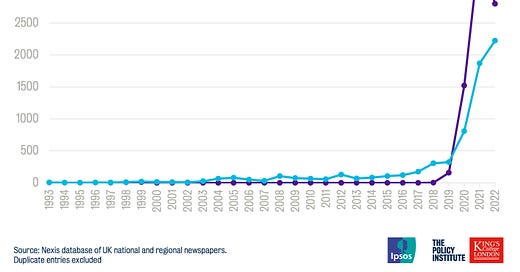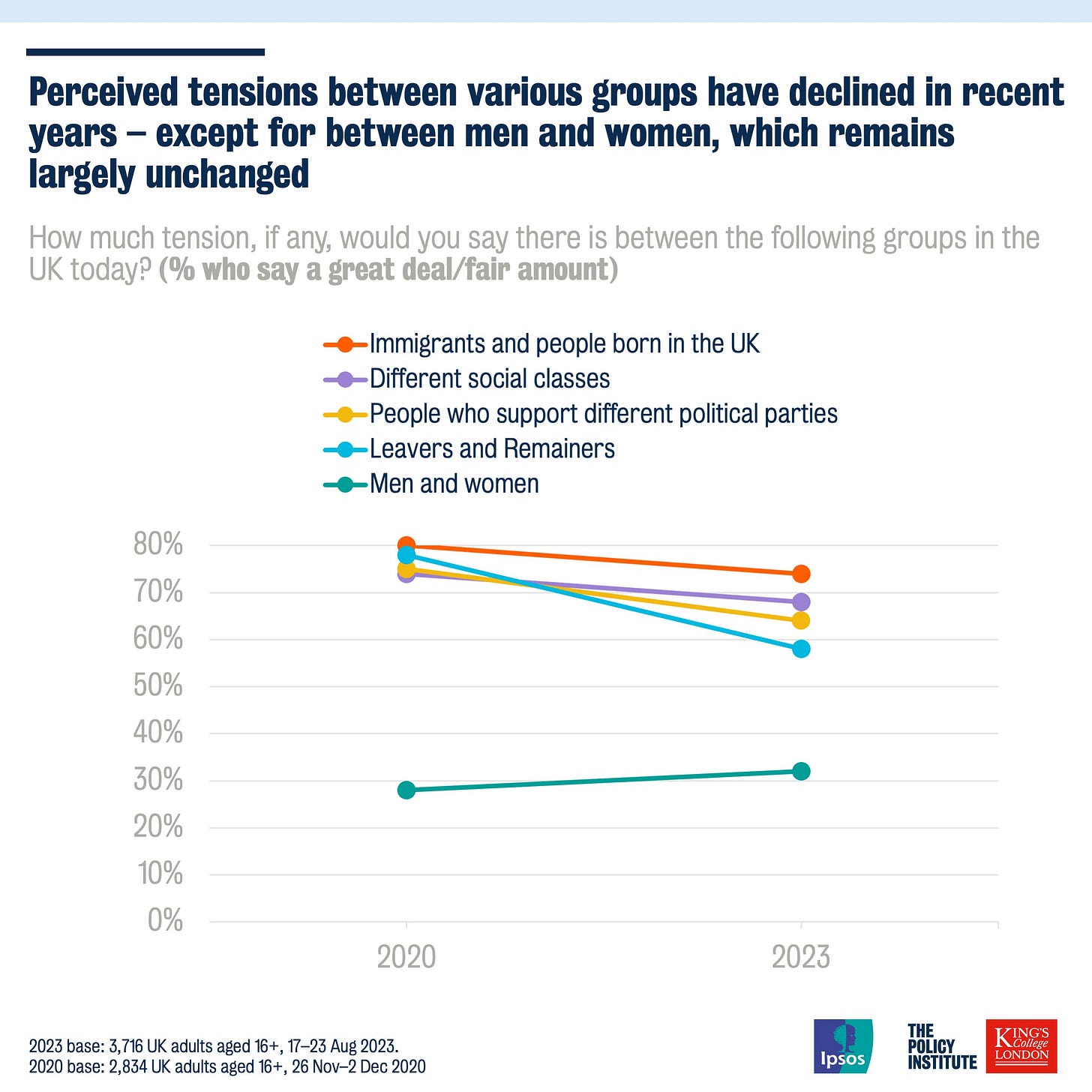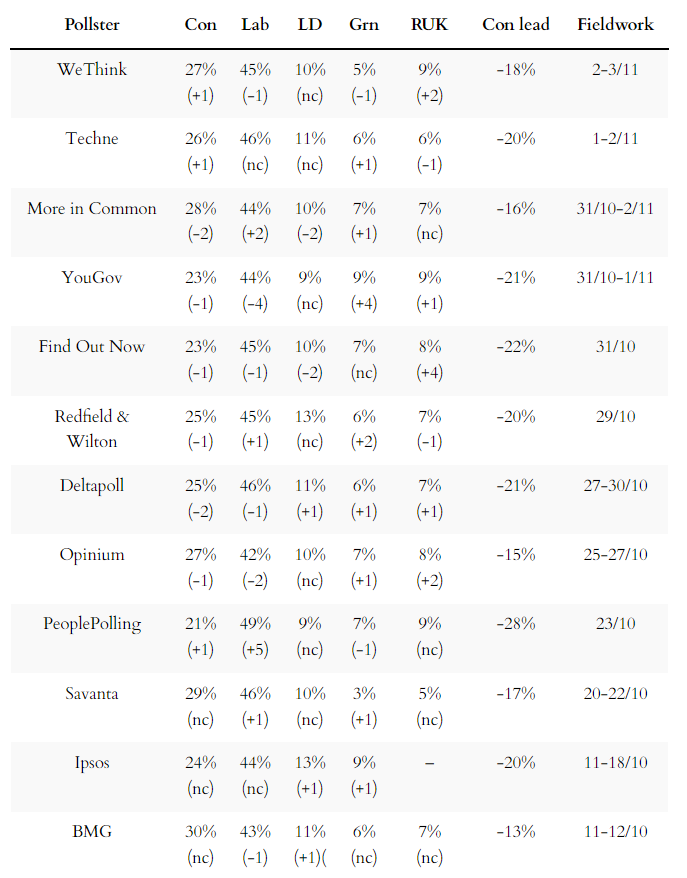Welcome to the 80th edition of The Week in Polls, which takes a dive into new polling from King’s College London and Ipsos on what the public makes of culture wars.
Then it’s a look at the latest voting intention polls, featuring the Duke of Wellington, followed by, for paid-for subscribers, 10 insights from the last week’s polling and analysis. (If you’re a free subscriber, sign up for a free trial here to see what you’re missing.)
But first this week’s note of gentle disapproval heads the way of Times Radio which went for a “BREAKING” tweet about a poll finding that Keir Starmer’s approval rating had dropped, relegating to a second tweet the crucial other half of the story that Labour’s poll lead was actually up in the very same poll. Predictably, the first tweet was seen 36 times more than the second tweet,1 which means that most people saw a partial, liable to mislead, report of the poll rather than the full story.
As ever, if you have any feedback or questions prompted by what follows, or spotted some other recent polling you’d like to see covered, just hit reply. I personally read every response.
Been forwarded this email by someone else? Sign up to get your own copy here.
Want to know more about political polling? Get my book Polling UnPacked: the history, uses and abuses of political opinion polling.
Or for more news about the Lib Dems specifically, get the free monthly Liberal Democrat Newswire.
Public increasingly see politicians as stoking culture wars
A new report from Bobby Duffy and the team at King’s College, based on polling by Ipsos and repeating questions asked in previous years, gives a rounded view of how the public in Britain views culture wars and the trends over time.
First up, we have growing awareness of the topic. Only 10% now say they have never heard of “being woke”, down from 32% in 2020, and 20% have never heard of “cancel culture”, down from 49%. As for the phrase I use most often myself when talking of this topic, “culture wars”, that’s now at 1-in-20 (6%) never having heard of it, down from 15%.
It’s unclear whether it is cause or effect that there has been a massive increase in the use of such phrases in the media:
With growing coverage and awareness has also come a growth in people seeing “woke” as an insult, up from 24% in 2020 to 42% in 2023.
However, less than 1-in-5 (15%) describe themselves as “anti-woke” with around the same number (16%) calling themselves “woke”. Two-thirds (63%) say neither label applies to themselves or they don’t know what the terms mean. Older men are more likely to call themselves anti-woke and younger women more likely to call themselves woke.
Moreover, asked if they think there is a fair or great amount of tension between different groups, people are generally less likely to agree now than in 2020. The exception is for tension between men and women:
However, people see the freedom to express opinions without interference as being at greater threat than the freedom from the expression of threatening or abusive opinions (41% to 15%, with 28% saying both are threatened and 9% neither).
Also, a majority (52%) now say that culture wars are a serious problem for UK society and politics, up from 43% in 2020.
But despite that, people are sceptical, and even not interested, in politicians talking about these issues.
Nearly two-thirds (61%) agree that politicians invent or exaggerate culture wars as a political tactic, up 17 points on 2020. Over half (56%) say that politicians who talk about divisions over cultural issues are just trying to distract people from other important topics, compared with 1-in-10 (11%) who say that politicians who talk about divisions over cultural issues genuinely believe that it’s an important topic.
Nor are people that keen on politicians talking about divides our cultural issues. A majority (51%) agree that when politicians focus on divisions over cultural issues it only divides society further, with 1-in-10 (12%) saying that doing so helps highlight ways we can improve society.
Asked what issues should be the main ones at the next general lection or which ones will determine their vote,2 inflation and the NHS dominate. Channel crossings are the closest to a culture war issue to register as mattering but only picked by a little over 1-in-10 people:
As Professor Bobby Duffy, director of the Policy Institute at King’s College London, says of this research:
The speed and scale of the UK’s adoption of 'culture war' issues and rhetoric in our media and politics has been one of the key trends of the last few years…
But opinion is also swinging against the use of these identity divisions, with one of the biggest shifts being the increase in the public’s perception that politicians are inventing or exaggerating culture wars as a political tactic. The evidence suggests it may not be a particularly successful approach to an election, as tiny minorities pick out culture war-related issues as important to how they’ll vote.
But the key concern here is not election outcomes. The real worry is that true US-style culture war divisions – where our views on a range of social issues become very tightly tied to our political identity – leave no room for compromise and are incredibly difficult to unpick once they become established.
You can read the full report here and for the longer-term trend on such issues, see my earlier piece, The long term liberalising of Britain.
Know other people interested in political polling?
Refer friends to sign-up to The Week in Polls too and you can get up to 6 months of free subscription to the paid-for version of this newsletter.
National voting intention polls
Yes, once again it was a week without a poll putting the Conservatives on more than 30%, extending the run stretching back to late June (when a Savanta poll gave them 31%). Ten of the twelve pollsters have the Conservatives doing even worse than they did under the Duke of Wellington in 1832, previously the all-time low for the Conservative Party scored in what was the first general election after the Great Reform Act and so long ago that the Conservative Party didn’t even really exist back then.3
Here are the latest figures from each currently active pollster:
For more details and updates through the week, see my daily updated table here and for all the historic figures, including Parliamentary by-election polls, see PollBase.
Last week’s edition
What to make of the Muslim Census data?
My privacy policy and related legal information is available here. Links to purchase books online are usually affiliate links which pay a commission for each sale. Please note that if you are subscribed to other email lists of mine, unsubscribing from this list will not automatically remove you from the other lists. If you wish to be removed from all lists, simply hit reply and let me know.
A glimmer of hope for the Conservatives in YouGov’s data on the don’t knows?, and other polling news
The following 10 findings from the most recent polls and analysis are for paying subscribers only, but you can sign up for a free trial to read them straight away.
Keep reading with a 7-day free trial
Subscribe to The Week in Polls to keep reading this post and get 7 days of free access to the full post archives.






